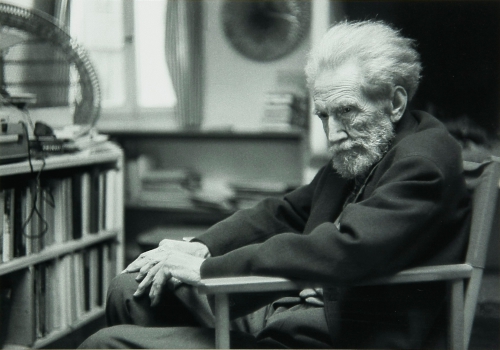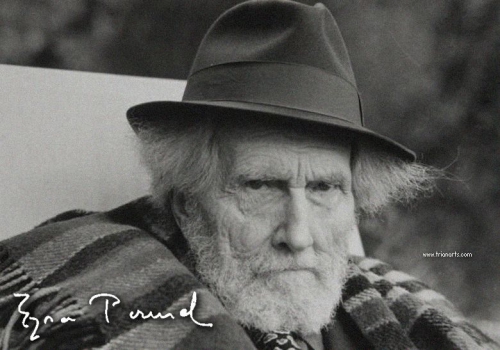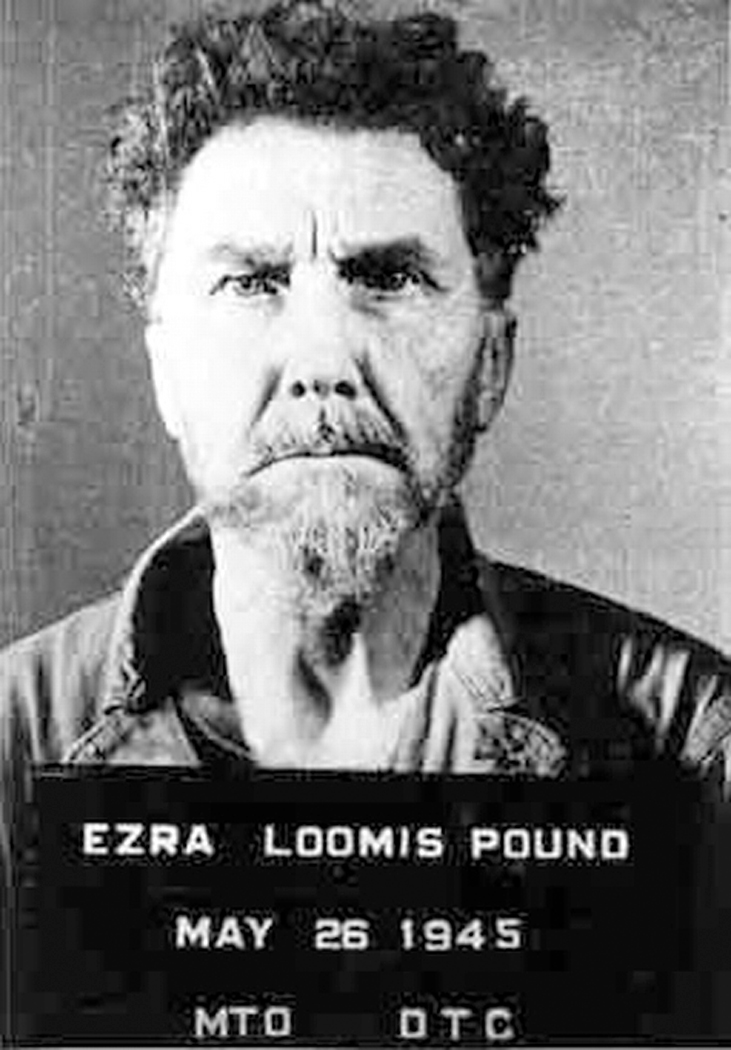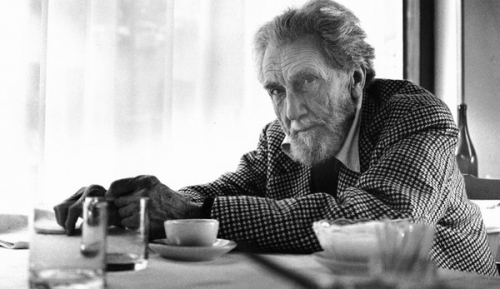lundi, 25 mai 2015
Ezra Pound and the Corporate State

Ezra Pound and the Corporate State
In a modern world subject to the numerical vagaries of bad credit and unbalanced algorithms, the Fibonacci number offers a pattern of sanity and intrigue. Know also as the Golden Spiral, this pattern appears as a perfect and dynamic model of order visible in creation, yet also demonstrates the intriguing attribute of having no beginning and no end. The spiral implies that from the micro to the macrocosm exist a fundamental and unbroken connection, implying a correlation between the health of one’s cellular structure and the socio-political forms of global order. Whereas Aristotle spoke of the Golden Mean, the Golden Spiral describes arrangements of natural phenomena ranging from the seed pod arrangement of a pinecone to spiral galaxies such as the milky way.
Somewhere along this ‘divine proportion’ has emerged what the great American poet Ezra Pound called a “canker corrupting all things”, leaving both cell and state compromised. CONTRA NATURAM! Lincoln called it “a black spot on the soul of a nation”. What Pound refers to is a subject and condition that has been poisoning the worlds cellular structure since homo sapien emerged, but has been successfully resisted until the past millennium brought forth an overpowering method of human economic interaction that is guaranteeing the eventual ecological collapse of the earth, with social collapse already a global visible phenomenon. It is an age which Pound says is characterized by the need “to sell, and sell quickly”. The acceleration of industry by usury which the modern world is built upon has led to the securitization of vast swathes of the earth’s surface, bringing forth untold trillions of apparent wealth, while leaving behind poisonous rivers and species extinction; an age in which even the air is tainted with industrial excess. Debt, the delayed contact with reality, allows men to profit off the future, Pound says to “rake in the profits resulting from changes in the values in the monetary units”. A 2006 US senate report noted that as much as 60% of the oil price rise since the early 2000’s were due to the activities of investment banks speculating on the oil futures market.
The poet offers us a Malapartian blend of fact and fiction, a tapestry weaving together historic truths with intelligent composition, creating the epic of the Cantos written over 50 years. His writings offer insights into economics, history, culture and the meaning of language. His enemy is usury, the enemy of freedom, his allies – none save his mind, which was declared lost in 1945, “when the raft broke and the waters went over me”, a charge which inspired the poet towards greater heights. Pound begins Cantos XLV “With usura hath no man a house of good stone each block cut smooth and well fitting that design* might cover their face”. If the absence of design is the mark of finance-capitalism then one understands that there is no end goal in sight, no purpose to be fulfilled, just rampant profiteering.”With usura is no clear demarcation” declares the poet; the lines between low and high, between ugly and beauty, between extinction and survival have been severed.
Discrimination, as Ian Dallas writes, forms the basis of sanity. R.D. Laing defined madness as the sane response to an insane situation. The madness of contemporary leadership is evident in their fundamentalist belief held in the magical brilliance of paper-money and democracy, while increasingly vast slums of the urban poor lead to new warfighting doctrines being developed by the state. Civil unrest, poverty and the imposition of draconian laws by a self serving state mean that the masses find themselves in a situation where citizen and terrorist are both addressed via uniform methods owing to budget-deficit enforced standardization protocols. In America, SWAT teams were once present only in the largest cities, now every mid sized city has one, routinely employing them in day to day activities such as the serving of warrants, with deadly consequences. Matt Apuzzo writes that “police departments have received tens of thousands of machine guns; nearly 200,000 ammunition magazines; thousands of pieces of camouflage and night-vision equipment; and hundreds of silencers, armored cars and aircraft.” with the result that the hardened American soldier returning home finds airport security using the same M4 assault rifles as he used in Afghanistan.
Pound writes that “with usura hath no man a painted paradise on his church wall”. With empty churches being converted to banks across Europe, and banks built like cathedrals, a paradise aspired to has become a laughed at chapter in history. Marx wrote that money has itself been endowed “with the properties of a quasi-religious nature”. Sheldon Wolin writes that under the corporate state “a giant corporation includes prayer sessions for its executives while evangelicals meet in franchised congregations while millionaire preachers extol the virtues of capitalism”
Paraphrasing Karl Polanyi, the American activist Chris Hedges writes that capitalism “turns human beings and the natural environment into commodities. This ensures the destruction of both society and the natural environment. The ecosystem and human beings become objects whose worth is determined solely by the market. They are exploited until exhaustion or collapse occurs. A society that no longer recognizes that the natural world and life have a sacred dimension, an intrinsic value beyond monetary value, commits collective suicide. Such societies cannibalize themselves.” The internal cannibalism of the united states, as evident in such dreadful carcass of Detroit testify to the reality of great lands under siege by usura.
If we may take a democratic approach to world history we may find interest in the fact that the majority have for the majority of the time found value in the belief that behind the perceived order or disorder of existence lay something beyond themselves, a sacred ‘design’ around which were built temples and civilizations. The loss of the divine has not been without consequence. James Mossman’s suicide note famously read “I can’t bear it any more, though I don’t know what ‘it’ is.”
The towering figure of Sheldon Wolin, a retired political science professor from Yale, has called the phenomena of our free society an “inverted totalitarianism” which stands in direct comparison with the classic totalitarianism of Nazi Germany and Fascist Italy. His extraordinary book of the same name explores layer by layer the social outcomes of advanced finance-capitalism as reflected in the world greatest inverted totalitarian regime, the land of his birth. What he documents is a phase in social organization that every capitalist state will eventually pass through, en route to harsher forms of control and financial insecurity. The correlation of debt to totalitarianism seems to be in the 21st century a valid theorem when evaluating the social costs of capitalism.

The defend the present with reference to socialisms failure is to divert attention from the de facto extension of state control over life towards the utopian belief in social and political freedom enshrined in a humanist doctrine espousing liberty, de jure. Inverted totalitarianism is the outcome of “investing de facto power with authority”. When money is power, government becomes the formal face of governance, but is itself beholden to real power originating elsewhere. In the inverted totalitarianism created by finance-capitalism, “economics trumps politics” as opposed to classical totalitarianisms where the economy is an instrument in the service of the political leader. Wolin writes that in this system “the leader is not the architect of the system but its product”.
The question of debt is not some sentimental affair dramatised by the stage antics of Bono and Blair, nor private in the case of ones personal debt or the national debt as a technical problem concerning the citizen of “his” nation. Patriotism quickly vanishes when the reality of the corporate state is understood. The question of debt reaches into the very DNA of the modern state and can be seen as the cause and effect of much social ill as well as the inevitable driver of every capitalist state towards harsher forms of control. Debt has been likened to a delayed contact with reality. This places today’s much vaunted ‘personal freedoms’ into a saner context: one day it will catch up with us because the imbalance that promotes unconstrained sexual freedom is the same that allows the unconstrained rape of the ecosystem.
As the corporate state oversees the wholesale sale of the nation and its prosperity, the resulting disintegration will necessitate the fusion of corporate monopoly with the security apparatus of the state, leading to the inverted totalitarianism of capitalist society. The media will explain that certain restrictions and draconian laws will be implemented in order to save our free societies. To prepare us for our the protection of our freedoms the state will offer us democratic accountability: the narrative states that our debt is the reason that we are collapsing as a society, a truth experienced personally by billions of the worlds poor. Cutbacks to pay off debt means that social welfare becomes a distant memory and decent jobs a privilege reserved for the faithful few. We will all pay the price as a collective, and we will maintain the respect for the law as is befitting a nation, and that those who do not endure patiently the remedy, will be processed by an efficient legal system which makes outlaws of those flaws in the system.
The privatized prison industry is one of the most worrying indicators of social malfunction. The constraint effects of debt and the jail cell were both issues experienced by the poet. “No man who has passed a month in the death cells believes in cages for beasts”, Pound said of his time in the open air holding cells of the American military. The death-cell was the experience given to Pound by the incipient American corporate state. His freedom denied, Pound found in his shackles the reality of the corporate state; those who trespass beyond the narrow confines of the economic motif fall outside the definitional framework of a money-civilization and are incarcerated; the dangerous masses through debt and exceptional individuals within concrete walls.

Whereas Carl Schmitt spoke of the ‘total state’ penetrating every aspect of society, Wolin speaks to us of a corporate state where every aspect of human life, from religion to culture, to people, become commodified, becomes exploitable, to turn a profit. When every aspect of life becomes subject to an economic determinism, when our impulses and physical movements are all in tune with market forces, then the corporate state has imposed a brilliant coup de etat, in effect rewriting society according to the dictates of one aspect of the human existence; making money, and exalted it above all else, creating the one dimensional man who’s dependence upon credit fosters the necessity of the credit industry. Matt Tabibi writes of America showing a “culture that is slowly giving in to a futuristic nightmare ideology of computerized greed and unchecked financial violence.”
If the illogical drive towards ecological collapse is not the intention of the financial elite, then we may find uncomfortable comfort in Wolin’s explanation that this system is perpetuated by “power-holders and citizens who often seem unaware of the deeper consequences of their actions or inaction”. This economic determinism underpinning the subconscious of modern man is visible at the political level where any social challenge is addressed via recourse to a ‘budget’ allocation. Where the destruction of Amazonian rainforests are measured in the billions of dollars and where climate change proposals are ignored as too expensive.
Survival is an instinct which has been lost by economic man. This was not lost on Carl Schmitt who witnessed the political extinction of a German republic which could not protect itself against an adversary using constitutional means to destroy the constitution. His nation’s fascist destiny was not beyond the powerful undercurrents of a European civilization succumbing to ‘market forces’. Karl Polanyi wrote that “fascism, like socialism, was rooted in a market society that refused to function.”
Whereas Carl Schmitt sought to protect the “political” from the corroding affects of a financial philosophy of history, Wolin writes that in the corporate state “It is politics all of the time but a politics largely untempered by the political”, low voter turnout but a simple indicator that the uneducated masses even know that what they are given as politics” is a media spectacle necessary for the holographic flame of democracy to stay lit. With the death of politics traditionally understood, anacyclosis as defined by Polybius has been supplanted by market forces, with its own cyclical logic visible on the stock market.
The corporate state may be defined as a mixed constitution of plutocracy, oligarchy and democracy with a state security apparatus which serves the front of the most powerful interests within that state. While a mixed constitution might appear as the recommended means of fostering stability by delaying the painful stages of political cycles, the peculiar nature of financial capitalism fosters a regime which Polybius would have rejected outright as tyrannical in the extreme; one of his negative regimes favoring the few over the many; the corporate state is by design anti-democratic.

Pound wrote that “The Scientists are in terror and the European mind stops”. It is significant that the monied narrative struck at the popular heart of western civilization by examining in minute details the debt problems in modern Greece. Our prized rationality itself seems to be undergoing restructuring as the home of the Acropolis sees right wing thugs carrying clubs and knives to “cleanse” the streets of this once great city. That citizens might employ vigilante violence against non-Greeks to cure a problem caused by the diseased logic of fiat money means that modern education has successfully forced us to equate squares with triangles, allowing easy reception to that other equation of freedom equals democracy and free markets. According to Wolin, inverted totalitarianism is the inevitable political form of capitalism.
In the maelstrom of these unfolding events, society should remember that even the Ancients Greeks had divine recourse; inscribed above the entrance of the Temple of Apollo was the exhortation “know thyself”, and as millions of activists worldwide strive to correct these wrongs, we would do well to remember the exhortation of Odysseus; “hold fast, my heart, you have endured worst suffering”.
*design/delight according to different versions of the text
Spanish version below
See also this old interview with Sheldon Wolin, and then buy his book
https://www.youtube.com/watch?v=-wlHB6jSe7s https://www.youtube.com/watch?v=K6HMQM7Lo58
Featured image from https://shapersofthe80s.files.wordpress.com/2011/06/roberts-vorticistseiffel1915.jpg
00:05 Publié dans Littérature, Théorie politique | Lien permanent | Commentaires (0) | Tags : ezra pound, littérature, lettres, lettres américaines, poésie, littérature américaine, philosophie, philosophie politique, théorie politique |  |
|  del.icio.us |
del.icio.us |  |
|  Digg |
Digg | ![]() Facebook
Facebook



Les commentaires sont fermés.